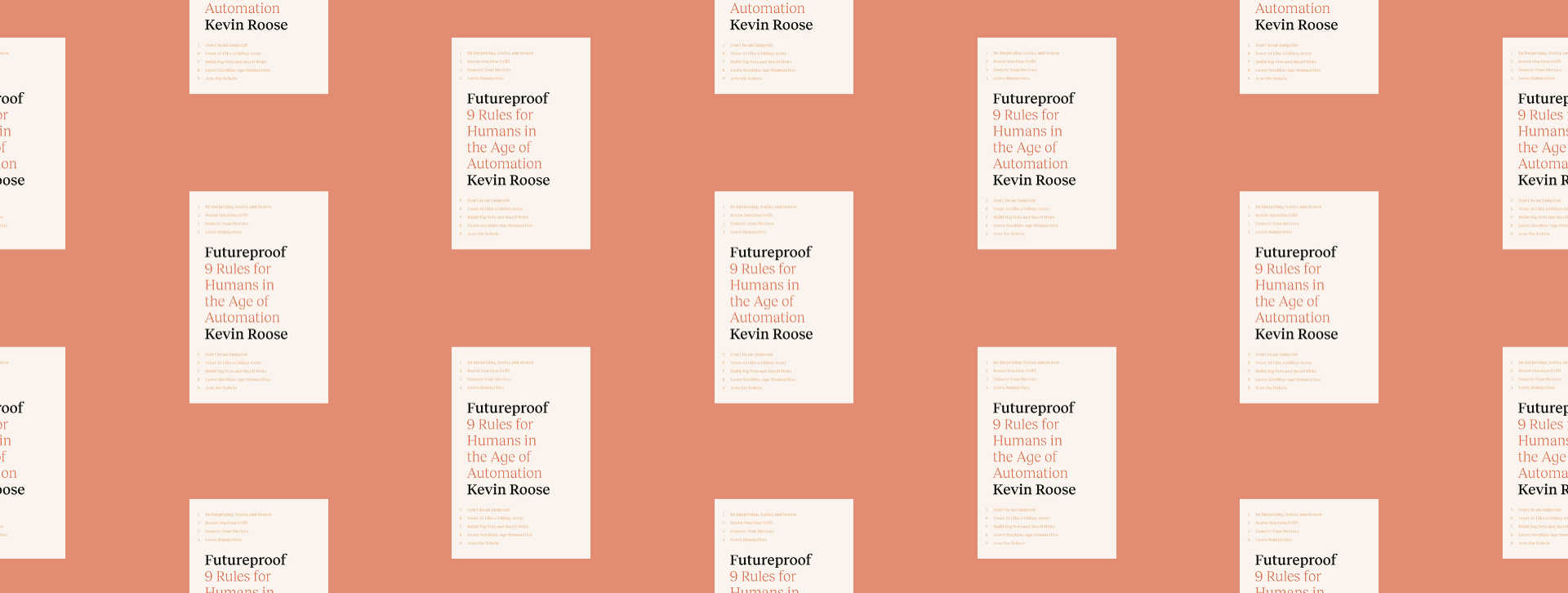Futureproof: 9 Rules for Humans in the Age of Automation
Author: Kevin Roose
Publisher: Random House
Goodreads | The StoryGraph
Click above to buy this book from my Bookshop.org shop, which supports independent bookstores (not Amazon). You can also find it via your favorite indie bookstore here.
Cover Description
The machines are here. After decades of sci-fi fantasies and hype, artificial intelligence has leapt out of research labs and Silicon Valley engineering departments and into the center of our lives. Algorithms shape everything around us, from the news we see to the products we buy and the relationships we form. And while the debate over whether or not automation will destroy jobs rages on, a much more important question is being ignored:
What does it mean to be a human in a world that is increasingly built by and for machines?
In Futureproof: 9 Rules for Humans in the Age of Automation, New York Times technology columnist Kevin Roose lays out a hopeful, pragmatic vision of how people can succeed in the machine age by making themselves irreplaceably human. He shares the secrets of people and organizations that have survived technological change, and explains how we can protect our own futures, with lessons like
Do work that is surprising, social, and scarce (the types of work machines can't do).
Demote your phone.
Work near other people.
Treat A.I. like an army of chimpanzees.
Add more friction to your life.
Roose rejects the conventional wisdom that in order to compete with machines, we have to become more like them — hyper-efficient, data-driven, code-writing workhorses. Instead, he says, we should let machines be machines, and focus on doing the kinds of creative, inspiring, and meaningful things only humans can do.
TL;DR Review
Interesting, approachable, and compelling, Futureproof was a pleasant surprise among this kind of nonfiction. It offers both moral and practical insights, and it reads quickly.
For you if: You love technology, but you also want to think critically about it.
Full Review
“Executives, not algorithms, decide whether to replace human workers. Regulators, not robots, decide what limits to place on emerging technologies like facial recognition and targeted digital advertising. The engineers building new forms of AI have a say in how those tools are designed, and users can decide whether these tools are morally acceptable or not.
This is the truth about the AI revolution. There is no looming machine takeover, no army of malevolent robots plotting to rise up and enslave us.
It’s just people, deciding what kind of society we want.”
It’s always refreshing to find general nonfiction books that offer more than an extended TED Talk. Futureproof was really well executed; it’s short and to the point, with compelling points and both moral and practical takeaways.
This isn’t one of those “technology is going to destroy the world” books — Kevin Roose, who loves technology, is here to take an honest look at how we’re using it today and our responsibility in how we choose to use it in the future. Technology can make the world better, or it can be used to exploit and harm, it’s up to us. In the first part of the book, he makes the case that today, corporations are doing mostly the latter under the guise of the former. He reminds us that industrial revolutions of the past were devastating for a lot of people in the moment and raises good questions about who will get left behind this time (will it be white guy engineers? probably not). That’s not to say we shouldn’t make technological progress — just that we have a responsibility to try to take care of people, not just profits, as we do. Roose also does a pretty good job, in my opinion, of pointing out issues of privilege along the way.
In the second part, Roose offers nine suggestions for how we can navigate the changing world as individuals — for example, resisting the ease of allowing algorithms to make choices for us, cultivating uniquely human skills, remembering that AI does not have morals; people do, and continuing to think critically about how tech is being applied. (I borrowed his suggestion to put a rubber band around my phone on days when I find myself mindlessly scrolling too much — it’s not a complete barrier, but introduces friction and helps me remember that I would rather not get sucked in today.)
You love (or work in) tech and also want to think critically about it, pick this one up.


